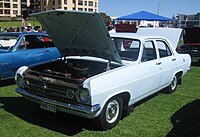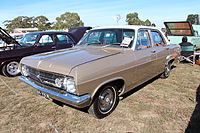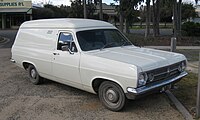Holden HR
| Holden HR | |
|---|---|
 Holden HR Special sedan | |
| Overview | |
| Manufacturer | Holden (General Motors) |
| Also called | Holden Standard Holden Special Holden Premier Holden utility Holden panel van |
| Production | April 1966 to January 1968 |
| Body and chassis | |
| Class | Mid-size |
| Body style | 4-door sedan 5-door station wagon 2-door coupé utility 2-door panel van |
| Layout | FR layout |
| Powertrain | |
| Engine | 2,639 cc (2.6 L) 161 I6 3,049 cc (3.0 L) 186 I6 3,049 cc (3.0 L) 186X2 I6 3,049 cc (3.0 L) 186S I6 3,185 cc (3.2 L) Chev. 194 I6 (ZA)[1] 3,768 cc (3.8 L) Chev. 230 I6 (ZA)[1] |
| Transmission | 3-/4-speed manual 2-speed Powerglide automatic |
| Dimensions | |
| Wheelbase | 106.0 inches (2692mm) |
| Length | sedan: 181.1 inches (4600mm) wagon: 180.2 inches (4577mm) |
| Width | 70 inches (1778mm) |
| Height | sedan: 58.3 inches (1481mm) wagon: 58.5 inches (1486mm) |
| Curb weight | Standard Sedan: 2601lb (1178kg) |
| Chronology | |
| Predecessor | Holden HD |
| Successor | Holden HK |
The Holden HR is an automobile that was produced by Holden in Australia from 1966 to 1968.
Introduction
The Holden HR range was released in April 1966, replacing the Holden HD series which had been in production since 1965.[2] In addition to a revised grille, the HR featured a reworked roofline and larger rear window (on the sedans), revised rear lights (on sedans and wagons) and changes to almost all exterior body panels.[3] Other changes included revised ball joint front suspension,[4] widened track, improved interior trim and woodgrain interior finish for the Premier models.[3] Six months after the launch of the HR, all models were given a safety upgrade with the addition of front safety belts, windscreen washers, reversing lights, sunvisors and a shatterproof interior rearview mirror.[3]
Model range
The Holden HR passenger vehicle range offered four-door sedan and five-door station wagon body styles in three trim levels with the six models marketed as follows.
- Holden Standard sedan [5] (HR 215)[6]
- Holden Standard station sedan [5] (HR 219)
- Holden Special sedan [5] (HR 225)
- Holden Special station sedan [5] (HR 229)
- Holden Premier sedan [5] (HR 235)
- Holden Premier station sedan [5] (HR 239)
The HR commercial vehicle range was offered in two-door coupe utility and two-door panel van variants, marketed as follows:
-
Holden HR Standard sedan
-
Holden HR Special sedan
-
Holden HR Special station sedan (with Premier wheel covers)
-
Holden HR Premier sedan
-
Holden HR Premier station sedan
-
Holden HR utility
-
Holden HR panel van
-
Holden HR Premier X2, with twin carburettors
Engines and Transmissions
The two versions of the inline six cylinder Holden Red motor were carried across from the HD series, both with increased engine capacity and a higher compression ratio [3] (9.2:1).[6] The 114 bhp 161 cu in (2.6 L) six was standard in all models except the Premiers.[5][7] A 126 bhp 186 cu in (3.0 L) six was standard on Premiers and optional on all other models.[5][7] The 145 bhp twin carburettor "X2" version of the "186" was initially available as an option on all models.[5][7] The "X2" was replaced by the 145 bhp "186S" in June 1967, the new version fitted with a single two barrel carburettor.[3]
A lower compression (8.2:1) version of the 161 cu in (2.6 L) six was also available.[6]
The 194 cu in (3.2 L) and 230 cu in (3.8 L) Chevrolet six-cylinder engine was fitted for the South African market.[1] This began partway through the HR's existence, with the 194 introduced for the 1967 model year.[8] The Premier Automatic sold in South Africa retained the Australian engine, at least until 1969.
A three-speed manual gearbox with column change was standard on the HR with a two speed "Powerglide" automatic transmission available as an option.[9] An Opel sourced [9] four-speed manual gearbox was offered from August 1967.[10]
Production and replacement
A total of 252,352 vehicles was produced up to January 1968 when the HR was replaced by the Holden HK series.[11]
The price at release was A$2286 for the 161 cu in (2.6 L) Special sedan manual and A$2856 for the Premier station sedan manual.[6]
References
- ^ a b c 1970 Holden HT Brougham, Restored Cars #174, Jan-Feb 2006, pages 27 to 28
- ^ Norm Darwin, 100 Years of GM in Australia, pages 238-241
- ^ a b c d e Holden Heritage, Eighth Edition, 1998, pages 34-35
- ^ Holden HR Technical Specifications at www.uniquecarsandparts.com.au Retrieved on 21 December 2013
- ^ a b c d e f g h i Turbo Smooth Holden, GMH sales brochure for Holden HR Sedans and Station Sedans, April 1966
- ^ a b c d e Bebbington, Terry; Malik, Michel A. (1994). 45 Years of Holden. The Australian Publishing and Printing Company. p. 37. ISBN 0-947216-31-6.
- ^ a b c d e New Holden, the Turbo-smooth profit pair!, GMH sales brochure for Holden HR utility and panel van, April 1966
- ^ Wright, Cedric, ed. (August 1968). "A car owners' report: Holden (1960-66)". CAR (South Africa). Vol. 12, no. 7. Cape Town, South Africa: Central News Agency Ltd. p. 28.
- ^ a b Holden HR at www.uniquecarsandparts.com.au Retrieved from www.uniquecarsandparts.com.au on 24 August 2010
- ^ Norm Darwin, 100 Years of GM in Australia, page 240
- ^ Norm Darwin, 100 Years of GM in Australia, pages 240-242








